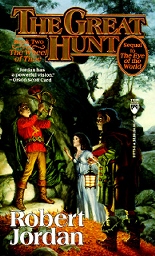 I’m currently 250 pages into Robert Jordan’s “The Great Hunt” and liking it so much more than “The Eye of the World”.
I’m currently 250 pages into Robert Jordan’s “The Great Hunt” and liking it so much more than “The Eye of the World”.
I also have the almost tangible feel that I’m reading something unique. You can re-read a book, but you can read and ‘live’ a story only once. The first time through is unrepeatable and precious on its own. I also know that the series has its peak with the fourth book (The Shadow Rising) and goes strong at least till the sixth. So I know that if I’m loving the second book there’s much more entertainment for me to have. I was reluctant to read Jordan because he has many haters, and those haters also have a point.
The Wheel of Time surely isn’t an overly original and interesting series, and as a writer Jordan has flaws. But at the same time there aren’t many *stories* like this one, told like this one. It’s charming, it flows. I come from reading Glen Cook’s Black Company that surely is a more interesting book, more trenchant. I like more the dark fantasy of Glen Cook, but Jordan has that charm of the flowing story. It’s so much more readable and immersive. It isn’t unpredictable, but you are caught into it nonetheless, if you let it catch you. Not original, but it’s as if Jordan is using the same notes to make an incredibly charming melody. It’s a melody you think you already heard many times, but never so charming and accomplished.
It’s incredibly accessible, fluid. That’s his talent, and bait for critics. You don’t read Jordan if you want a new, surprising, unconventional kind of fantasy, or if you want something clever. But you read Jordan if you want to read a “story” that feels like the archetypal story. Something ageless.
So while my interests and preferences don’t correspond to Jordan, the book is still capturing me more than books that I would rate above his.
This second book is superior to the first, as I said. Not as Tolkien-esque, better structured, moving at a faster pace and building on top of the first book. While the first was an “escape”, this one is a “quest” (hunt). I also have the impression that Jordan isn’t just writing the same book twice, but that the plot was structured before the first book was written, and that this second book is telling another part of the story. The story has more breadth, better pacing, till now.
Some ideas at the basis of the series aren’t anything mindblowing, but they are always archetypal.
“I-will-not-be-used!”
This feels a bit like Shinji’s “I will not flee” (Evangelion) mantra. Both characters are a bit too much whiny and overdramatic for my taste but behind Rand there’s a concept that is interesting on its own.
Contrary to LotR where the power is in a object (the ring), in WoT the power is in Rand himself. So he cannot simply dump the burden on someone else, nor escape because he is his own trap.
“With great power, comes great responsibility.”
Nor he is part of the super-hero mantra. It’s not about abandoning one’s sense of responsibility so that others will do the task. It’s not about not caring. He simply doesn’t have an easy way out because the only way to avoid the worst (for himself and others) is to do something. He knows he has a power that will destroy him and those around him if he DOESN’T do something. So he HAS to do.
But what to do?
He is clueless. He has no idea about what is going on but at the same time he has the mantra of the title. He won’t let others manipulate him for their own interests. He will not harm to favor others.
The trap is that he knows he doesn’t want to be used, but doesn’t know how they’ll try to use him. How they’ll trick him. He know he can’t outsmart them. He could do everything and the contrary but that would be an even surer way toward the disaster. He can’t act randomly. He knows he has a very little hope to avoid the disaster. So it’s not a toss of a coin. It’s something extremely delicate, something he has to be careful with.
The only ones who know more than him and who can help him, he cannot fully trust. The Aes Sedai are his help, but also those who want to use him and the closest menace. He also knows where the “evil” is, so he knows where NOT to go. That’s the only certainty.
And all this leads to an interesting situation. There’s good and evil. The evil side is not shade-of-gray, but truly evil as the archetype demands. On the other side (the light) there are different factions who claim to be on the right side and be the voice of that side, and, ironically, the templars are the worst of the bunch. Everyone acts in the name of the light, but where this light truly is, is undetermined. Or maybe a matter of choosing the less worse.
Feels a bit like the political situation in modern times. We all share an universal concept of “evil”. But when it comes to find the right thing to do there are thousands of voices overlapping, and no convincing alternatives.
Anyway, this leads in the books to an interesting scenarios: he has good and evil both whispering things at his ear. Tugging on his sleeve.
But the “evil” is the only one to always tell the truth.
P.S. – SPOILER
In fact in the first book “evil” coincides with “stupid”. As it’s the Dark One himself to suggest Rand how he can be defeated.
Dark One- “Nooo, you won’t use the ‘eye of the world’ against me *wink-wink, nudge-nudge* Nooo!”